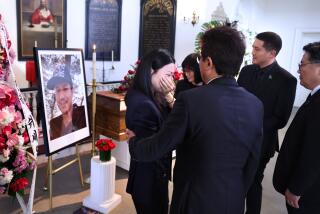Many Find Verdict Fair, But There Is Still Outrage : Killing: Leaders in African-American and Korean-American communities think the Du jury picked the least inflammatory verdict.
In the end, some were sad, a few were relieved and many were angry.
But as news spread through the African-American and Korean-American communities Friday that Soon Ja Du had been found guilty of voluntary manslaughter for the fatal shooting of Latasha Harlins, there was much agreement that it was a just conclusion to the racially sensitive case.
Despite some fiery rhetoric, many leaders in both communities said the verdict was probably the least inflammatory choice of the four charges the jury weighed.
A lesser verdict, such as involuntary manslaughter or acquittal, might have created an explosive situation in the black community, they said; a second-degree murder conviction might have left Koreans feeling unfairly persecuted.
“In my view, justice has been done by the verdict,” said Joseph Duff, president of the Los Angeles chapter of the National Assn. for the Advancement of Colored People. “A person has been found criminally guilty of killing and I think that’s pretty damn important.”
Jerry Yu, executive director of the Korean-American Coalition, agreed, adding that not all in the community offered unconditional support for Du.
“We can relate to her as a Korean and we can pray for her that she not suffer,” Yu said. “But, on the other hand, just because we are Korean, that doesn’t mean we wanted her to get off. There has to be justice.”
There was, however, outrage in both communities.
“This was a travesty of justice in the absolute highest order,” said Danny Bakewell, president of the Brotherhood Crusade. “A woman called me in tears. She wanted to know, does this mean that my child can be murdered before my very eyes and the person responsible not pay the price for it?”
Los Angeles City Councilman Mark Ridley-Thomas called it “another assault on the quality of life and the dignity of African-Americans.”
“It will be read as the court having turned its back on what is obviously a senseless killing of a teen-ager, by an adult--by a merchant, directed at a consumer,” Ridley-Thomas said. “It should properly be interpreted as a setback.”
Korean-American leaders, however, said for them it was not a day for celebration either.
“I think there are many people in this community who will feel (the verdict) was too harsh,” said attorney T.S. Chung. “A significant number probably feel (the shooting) was justifiable self-defense. . . . But I don’t think there would be one verdict that everybody is willing to accept.”
Chung also voiced a widely shared concern--that by imparting social or political importance to the case it is no longer one woman on trial but the entire Korean-American community.
“It’s just one case . . . a sad case . . . but it should not have any greater significance attached to it,” said Chung, a former candidate for the state Assembly. “We haven’t had a demonstration every time a Korean shop owner gets killed.”
The trial stemmed from the March 16 shooting by Du of Harlins after the Korea-born grocer accused the black teen-ager of stealing a bottle of orange juice from her south Los Angeles liquor store.
The incident inflamed black-Korean relations, sparked protests and led to calls for conciliation. Just last week, black and Korean leaders, with the help of Mayor Tom Bradley’s aides, negotiated a fragile truce aimed at easing racial tensions.
Under the agreement, the boycott of another South-Central liquor store, sparked by the killing of a black man by the Korean-American owner, was suspended. The store will be offered for sale, initially to African-American buyers.
Few civic leaders were willing to speculate what impact Friday’s verdict might have on the truce, but officials planned to closely monitor the temperature of the communities.
“I know the black community is probably not happy with this verdict, but I think it’s fair and hopefully they’ll accept it,” said Kathy Kim, development coordinator at the Korean Youth Center.
Halford H. Fairchild, a social psychologist of African-American and Asian-American descent, said he was hopeful that the verdict was “sufficiently middle ground” to help contain any negative aftermath.
“Outrage is understandable and it is perhaps appropriate for the African-American leadership to voice those kinds of concerns,” Fairchild said. “But I don’t think it recognizes the tragic elements of this killing.
“In my opinion, a large part of it was a byproduct of the inequality built into our society,” he said.
“It was the result of a whole lot of social, cultural and economic factors that both Latasha and Mrs. Du were caught up in.”
More to Read
Sign up for Essential California
The most important California stories and recommendations in your inbox every morning.
You may occasionally receive promotional content from the Los Angeles Times.










